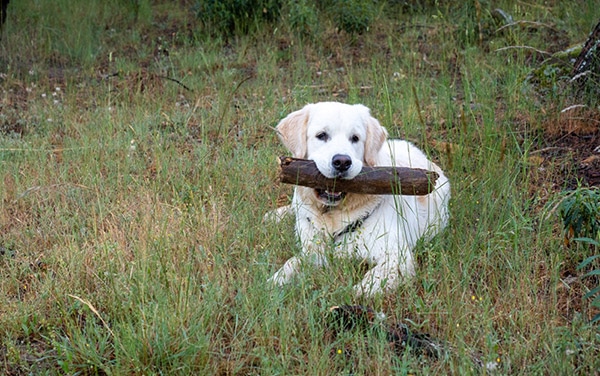Dogs are amazingly playful, loyal, and energetic creatures.
Dogs have developed since ancient times to be domesticated pets, yet still carry some of the same traits that they first had as wild animals.
From hunting small prey, going around in circles before laying down, and of course, loving meat, dogs can still act just as they did centuries ago.
One of the most interesting traits dogs have continued to have is their love of sticks and playing fetch.
For those wondering why dogs like sticks so much, we have the answers below.
It involves a combination of instinct, fun, and science!
Breaking Down Instincts
Dogs love to forage, hunt, and play, and sticks provide a chance to do all three of these at once.
Dogs love the way finding a stick feels after a long day of “hunting,” and might view them as a reward.
Of course, most dogs don’t really have the chance to hunt actual prey nowadays.
However, if your dog likes to get sticks after playing at the park, foraging through the forests, or simply walking down the sidewalk, it could allow them to use their primal hunting skills and capture their “prey.”
Dogs might also begin to swing their heads and clamp down hard on their sticks in an effort to mimic killing actual prey.
Now you know why winning in a tug-of-war game with them might be impossible!

Sticks Feel like What?!
For us humans, sticks might feel hard and uncomfortable to even carry in our hands, much less in our mouths.
But for dogs, sticks mimic the feel of a porous bone and come close to the real thing!
The shape and texture of sticks also allow dogs to chew on them freely when a bone isn’t around, making it a great substitute for toys as well.
Sticks are as unique as the dogs that love to play with them, and they come in a variety of textures, shapes and sizes.
From tough, larger sticks to softer, more chewable twigs, dogs enjoy the variety of textures in their canine mouths just like us humans love to have different textures when we eat our food.
The Joys of Chewing
Having something to play with in their mouth is fun for dogs, but it can also be a great pain reliever.
For puppies in their teething phase, sticks provide a way for sore gums to be soothed.
Teething might cause dogs to chew on more items in addition to sticks, such as your home’s couch or your car seats (ouch).
Dogs are also used to holding things in their mouth not just when hunting, but also for fun.
Just like tennis balls, stuffed animals, and your favorite shoe, sticks are no different.
Chewing sticks also allows dogs to let out pent-up energy and can be a natural stress-reliever, much like grinding teeth for humans.
However, unlike humans, dogs mouths are equipped for munching on sticks for as long as they need it.
They Smell Amazing
Maybe not to us humans, but to dogs, sticks carry scents with them that we could never smell or pick up on.
From mossy, musky, Earthy scents, to crisp water soaking into a stick after a rain shower, it’s no wonder sticks are irresistible to dogs.
Although sticks might not be the best nutrition for a dog, sometimes the smell can be all a dog needs to start craving sticks and twigs.
However, if a dog has a nutritional deficiency, known as pica, they will try and make up for it by trying to ingest sticks, soil, rocks, clay, or anything else around.
If you notice your dog is constantly chewing on sticks and also has other nutritional or feeding issues, it’s important to talk to your vet.
Because They Can
There’s nothing wrong about dogs loving sticks, and playing fetch can be as much of a reward for them as actual hunting.
These natural predators have many reasons for loving sticks, from fun, to instincts, and stress-relief.
Take your dog on a walk and watch them rejoice at the sight of a fresh, wooden twig.
